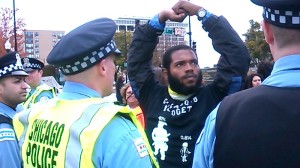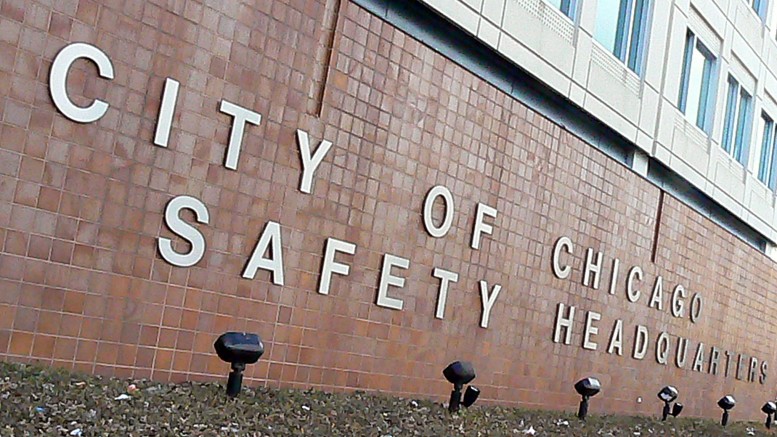Should be replaced with elected police accountability board: Activists say
La Risa Lynch
Frank Chapman has long been critical of Chicago’s top officials — including a City Council that shelled out more than $500 million in taxpayer money to settle police brutality cases over the years, and a mayor and police force that uphold a system allowing such abuses.
Chapman talks a big game — but the Chicago Alliance Against Racist and Political Repression (CAARPR) is backing it up with a solution: a civilian police accountability council (CPAC).
“CPAC would take the power from the mayor, from the City Council, from the Independent Police Review Authority, from the Police Board, from the Internal Affairs Department and put it in the hands of people who live in the police district. They will have the power,” said Chapman, an organizer with CAARPR.
The Chicago Alliance Against Racist and Political Repression has been advocating to establish an elected civilian police accountability council since 2012. But the group says City Council members have yet to fully embrace the idea even as they call for reforms in the police department in the wake of the shooting death of 17-year-old Laquan McDonald.
Outrage over the dashboard video showing the fatal shooting of McDonald being shot 16 times by Officer Jason Van Dyke ignited days of protest in Chicago streets with marchers and activists demanding reforms in the Chicago Police Department and the mayor’s resignation.

A protester faces off with police during a demonstration against the International Association of Chiefs of Police conference held last October in Chicago.
Protesters have demanded a federal probe into the police, the state’s attorney’s office as well as Mayor Rahm Emanuel’s administration to see if steps were taken to suppress the video until after the mayor won a heated runoff election. Additionally protesters have asked for a “real” independent police oversight council that can effectively and unbiasedly investigate and prosecute police crimes.
While the mayor’s resignation seems unlikely, the U.S. Department of Justice announced a civil rights investigation into the police department, which signals a win for protesters. But their cry for a truly independent civilian police oversight board could be closer than most think if City Council officials buy into the idea.
Backing CPAC, Chapman noted, would end rubber-stamp payouts that take place without broader police accountability.
“They got exposed in the Laquan McDonald case,” Chapman said. “This is their chance. If they want to try to right some of the wrong that they’ve done then they can support CPAC.”
Anatomy of CPAC
CAARPR’s proposal would replace both the Independent Police Review Authority (IPRA) and the Chicago Police Board with a civilian-led council made of residents publically elected from each of the city’s 25 police districts. The latest push for the civilian board comes as IPRA, the agency that investigates police wrongdoings, faced criticism over its lack of transparency, which some advocates say favors police and has led to a paucity of disciplinary actions for serious police misconduct complaints.
Between March 2011 and September 2015, 28,567 abuse allegations were filed against CPD officers, yet less than 2 percent resulted in any punishment, according to the Citizens Police Data Project, a new database that analyses police misconduct complaints. Since IPRA’s inception in 2007, the agency investigated 400 shootings and found only two “unjustified.”
CPAC would have the power to investigate allegations of police misconduct and police shootings, refer cases to the federal grand jury for civil rights violations and fire police officers. CPAC would also have the power to appoint the city’s police superintendent and rewrite the police rule book including use of force guidelines.
But the proposal has not been yet introduced in the City Council. Though half a dozen aldermen have expressed interest or are sympathetic to the cause, none has publicly committed to supporting CPAC yet, Chapman said.
Among those interested, Chapman said, were Aldermen Rod Sawyer (6th) and Toni Foulkes (16th) who did not return calls seeking comment. Random calls to council members including, Joe Moreno (1st), Howard Brookins (21st) and Scott Waguespack (32nd) to gauge where they stand on CPAC were not immediately returned.
“We are organizing people in the wards to get the aldermen to pick it up. This is a political campaign,” Chapman said comparing it to the people-driven movement that got Harold Washington elected as Chicago’s first black mayor. “We do not want to go to the aldermen without the backing of the people. That’s the bottom line.”
In the meantime, CAARPR has set up committees in Englewood, Austin and Woodlawn — communities with a high incidence of police violence — to advocate for systemic change in the department.
Currently there are more than 200 civilian police oversight entities in the country. Many consist of a mix of volunteers and appointed personnel, though their powers to investigate and punish officers vary. If enacted, Chapman noted CPAC could be the only citizen-elected police oversight board in the country. Also many grew out of Department of Justice investigations similar to the federal probe currently underway in Chicago and were created by public vote, state or city statute similar to a case in Pittsburgh.
The 1995 the fatal shooting of black motorist, Jonny Gammage, by Pittsburgh police officers led to the approval two year later of a citizen police review board via public referendum after several early attempts failed. However, the board’s recommendations are non-binding and must be approved by the city’s police chief, a situation that can render some citizen review boards powerless.
Pittsburgh’s citizen review board highlights a myriad of challenges that can erode the effectiveness or authority of police oversight boards including who sits on them. Members should be credible enough to weigh community interests with that of city government — a balancing act that IPRA continually gets wrong, according to critics. IPRA’s investigators mostly consist of retired or former police officers while the Chicago Police Board has been derided by activists as being a rubber-stamp board filled with mayoral appointees.
Other hurdles to establishing is pushback from police unions. New York City experienced such a situation in 1965 when it attempted to include civilians on a police review board. Police unions railed against the idea which was eventually defeated in a citywide vote. Nearly two decades later, the city re-established civilian oversight of the police.
St. Louis also faced a similar situation. The shooting death of 18-year-old Michael Brown by a white police officer last year in Ferguson, Missouri, a suburb of St. Louis, fueled calls for civilian oversight of the police. The city’s police union opposed the idea, saying that it would “restrain” officers from performing their duties. After contentious debate, St. Louis approved in April a measure to create a citizen oversight board, which some say doesn’t go far enough because it lacks subpoena power.
In Chicago, a growing chorus of politicians and community leaders are lending their voices to dump IPRA. Chicago’s South Austin Community Coalition Council has signed on to support CPAC, but Elce Redmond, an organizer with the west side group, recognizes there will be resistance from the Fraternal Order of Police, the state’s attorney’s office and “the powers that be.”
“Once you start saying there is going to be an independent authority looking over the police, then it is going to expand to looking over politicians and they really don’t want that,” Redmond said, adding that it opens the door for “politicians who are culpable in many of these situations” to be prosecuted as well.
When reached for comments, the national Fraternal Order of Police referred comments to the local chapter. Dean Angelo, Sr., president of the Chicago FOP chapter, did not return calls or respond to emailed questions seeking comment.
Cook County Commissioner Richard Boykin (1st) has called for a federal probe into the mayor’s and state’s attorney’s office. He’s also called IPRA “a sham, a shame and a disgrace” that has lost all credibility. He welcomed any effort to create a “real independent board” even if through the ballot box, but cautioned that elections have their downside when money is involved.
“You don’t necessarily get the best and the brightest running for public office,” he said. “You get the person who has the most money [or] can put the most money in places [to] fund people and then actually control them.”
Chapman balked at Boykin’s comment. He questioned why a politician would be suspect of the process that got him elected to office. But Chapman noted that CPAC’s elections will be different because they will be decentralized where residents from each police district vote for a CPAC member..
“Why would an elected official be against an election?” he asked. “How in the hell did he get into office. Here you are an elected official saying you don’t trust elections because they are corrupt. We are not talking about professional politicians. We are talking about people who live in [those police] districts.”
Damage control
Attorney Standish Willis has been here before. The civil rights lawyer called for civilian oversight of the police when torture allegation surfaced under former commander Jon Burge. Burge was convicted of lying to federal prosecutors about torture allegations and was sentenced to four years in prison. He was released in 2014.
“I think it is worth fighting for [but] I don’t have confidence that the City Council will pass it because they are not that independent,” Willis said.
But he praised CAARPR for their continued push to create an elected civilian police accountability council. The group began pushing for CPAC soon after the death of Rekia Boyd, who was shot and killed by a Chicago police detective in 2012.
“It’s always good to raise [the issue] because I think people that pay police should have control over police, especially in the context of what police have been doing over the years with people of color, particularly black people,” Willis said.
Instead both the mayor and City Council are in damage control mode. Emanuel made an impassioned speech before the City Council December 9 taking ownership and then apologizing for the McDonald shooting, though his critics continue to call for his resignation. The Council’s Black Caucus later released a 7-point plan to reform the police department — none of which called for creating a truly elected civilian police board.
Those reforms, however, did include a mandate that CPD “stop shooting people in the back,” prosecute police officers who file false reports, appoint a special prosecutor in officer-involved shootings and include community members on the mayor’s blue ribbon task force on police accountability.
Meanwhile, the police shootings of McDonald, Boyd and Ronald Johnson and the subsequent payouts demonstrate the need for elected civilian oversight of the police, added Ted Pearson, CAARPR’s co-chair.
A Chicago Police officer shot and killed Johnson, who was armed at the time, but was running away from police. No charges were filed against the officer involved in the shooting.
“The only way we are going to solve this problem is when the people are in charge of the police. It is not such a radical concept. It is a very democratic one,” he said.
But Pearson blasted Emanuel’s appointment of Sharon Fairley as the new IPRA chief after Scott Ando resigned, a day before the Justice Department announced its investigation into the Chicago Police Department.
“They are rearranging the chairs on the deck of the Titanic,” Pearson said. “The ship is in trouble and they are trying to save it just by rearranging things. It’s not going to result in any changes until we have real community control of the police.”
This report was published in collaboration with City Bureau, a Chicago-based journalism lab. Additional reporting by Eleanore Catolico.

Be the first to comment on "Movement gains momentum to dump IPRA, Police Board"